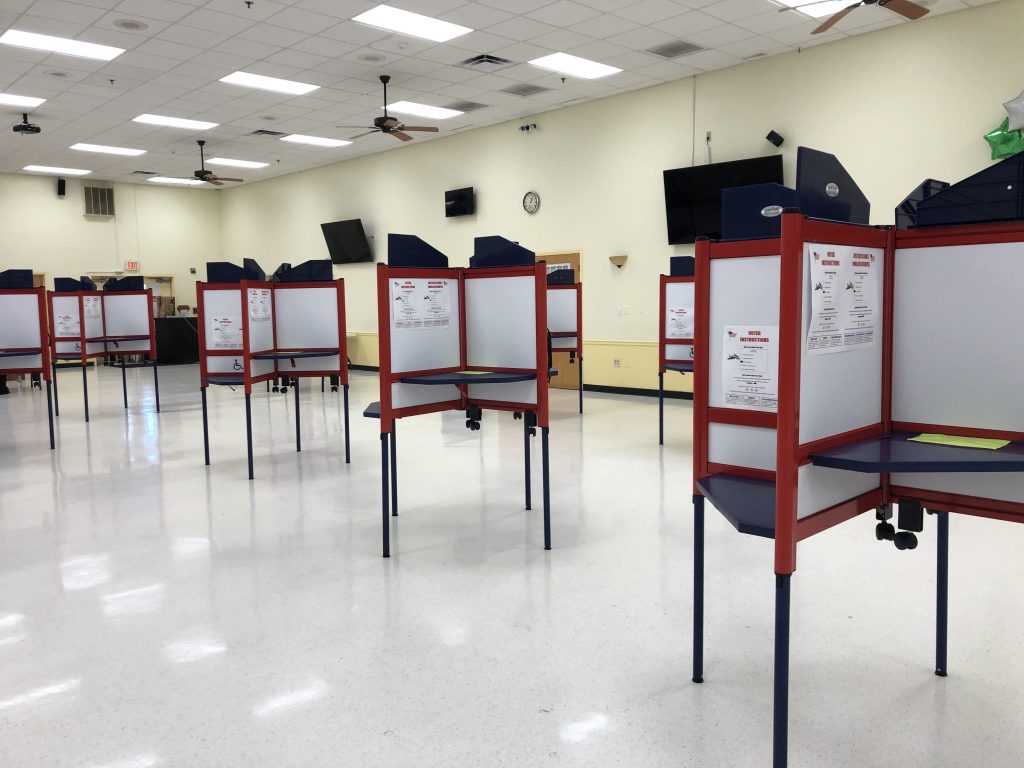Amid the COVID-19 outbreak, Floridians still voted in increased record numbers in the 2020 presidential preference primaries.
Florida Secretary of State Laurel Lee said in a press conference that the Sunshine State had already reached nearly 2 million early and by-mail voters by Tuesday morning.
“We are fortunate in Florida to have numerous options to cast our votes securely and safely,” Lee said.
Though other states like Louisiana and Ohio canceled their primaries due to the pandemic, the Florida Department of State put out a statement Friday saying they were working closely with authorities to assess the risks and follow health guidelines.
Florida’s decision to remain open for elections paid off. Both mail-in and early voting ballots, plus the votes cast on election day Tuesday, make for a record total of over 5 million voters. A notable increase from the 4 million voters in the 2016 Florida Presidential Preference Primaries.
Ultimately, voting was deemed a low-risk situation by Florida authorities, as they said they were not expecting big lines or crowds at the precincts and all voting machines and stations would be sanitized constantly.

“We reached out to all Supervisor of Elections’ offices and have been assured that poll locations are prepared and equipped for voters,” Lee said during the press conference. “Supervisors have taken health precautions to mitigate the spread of COVID-19.”
Lee said all polls except one in Broward County opened on time Tuesday morning, and everything possible was being done to ensure that anyone who made it to the lines by 7 p.m. would get their chance to exercise their right to vote.
To make voting accessible to all — especially for those concerned about COVID-19’s exposure — Lee said pick-up ballots were made available throughout early voting and all day Tuesday.
The ballots could even be picked up by another individual, as long as the voter properly designated them on the official affidavit provided. The point was to make sure people were not in any danger while voting.
“Sanitation and safety are our top priorities,” Lee said.
While the nation waited for polls to close in Illinois and Arizona — the two other states also having elections on Tuesday — former Vice President Joe Biden is announced as the unofficial winner of the Florida Democratic Primary. The official results will be announced by March 31.
It was a comfortable win for Biden, who held a steady lead over Sen. Bernie Sanders (I-Vt.) during the count. Meanwhile, President Donald Trump is still expected to remain the Republican nominee for the 2020 race, according to the Florida Division of Elections’ website.
Shahaan Khan, the director of political affairs for College Democrats at UCF, said if Biden wins the nomination, it will help bring a lot of support from the moderate Democratic establishment.
“It’ll be good to know we have the support from up top,” Khan said. “We’ll be working tirelessly to get Trump out of office.”
Khan said that working as an organization during the time of a national health emergency has been trying, as gathering in large groups is strongly discouraged right now.
“We honestly don’t know what to do,” Khan said. “We’ve been phone and text banking with different organizations, but unfortunately, we couldn’t organize something as a club.”
Despite challenges, Khan said the College Democrats at UCF were fired up to stand behind the Democratic nominee, and Biden’s proposal to choose a woman as a running mate was a good idea as long as it serves public needs.
“Bringing a woman on is a good step for his campaign,” Khan said. “Ultimately, I hope his VP pick is someone who represents the people’s interests.”
The voter turnout was a testament to how this election season has engaged Floridians like Alina Alvarez, UCF sophomore psychology and creative writing double major.
Though disasters like hurricanes may be nothing new to Florida residents, novel pandemics — like COVID-19 — extending globally are new to many individuals. In a March 13 press release, elections officials said Americans have participated in elections during challenging times in the past, and are confident that voters can safely cast their vote based on the information from public health officials.
“I think it was pretty bold on Florida’s part to be honest,” Alvarez said about keeping the polls open Tuesday. “Like, it definitely wasn’t the safest choice. I don’t think I was afraid because I was so focused on voting.”

Alvarez voted the University Unitarian Universalist Society, in Orange County, Florida, where she said she does not remember if cleaners were out or not — she said she was asked a lot of questions about where she had spent her time during spring break.
As expected by Florida authorities, precincts were not crowded due to early and by-mail voting. Alvarez, who voted for Sanders, said her precinct was practically empty when she showed up around 11 a.m. She said this helped her breathe easy without fear of infection.
“The polls were dead,” she said. “I wasn’t really worried about the exposure.”
For a state with a history of messy elections, Florida managed to pull off a model, successful and fair event this year.
The next Democratic primaries are set for Mar. 29 in Puerto Rico.




